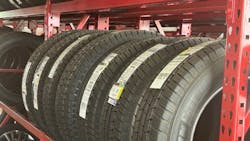Townsend: Can You Be a Good Owner But a Bad Operator?
As I look at the headline of this article, I realize that some people who own a tire dealership — that means one store or more — may not be able to answer the question listed in the headline. Why?
They might not know what being a bad operator looks like because all they know is how to run their store.
Before we dig into this subject, it’s important to know that I have met thousands of tire store owners since 2006, from the owners of one store up to the owners of 100 stores, and I can tell you, beyond a shadow of a doubt, that tire dealers are some of the best human beings in the world. The majority truly care about people and, as we say in the South, are “salt of the earth.”
The challenge has been getting some of the ones I’ve met to admit that they were less-than-stellar operators.
Of course, this attribute is unintentional on their part. I never knew any tire dealer or tire store manager who went to work on a Monday morning and said, “Let me see if I can be a bad operator at my store today.” The fact is, many didn’t know what they didn’t know and therefore unintentionally harmed their businesses.
I found an owner recently who could be defined as both a good owner and a good operator. It’s just the way things have unfolded since I met this owner about 15-plus years ago. This being said, I think we can say with almost 100% certainty what makes a good owner and what makes some one a bad operator. So let’s start with the negative and end on the positive. First, what are some of the most significant traits of bad operators?
- A bad operator has a higher than normal turnover rate.
Good operators know that employee turnover is bad in the tire and auto repair business. They also know that turnover is expensive and costs them time and money. Both of these — especially time — are virtu ally impossible to recoup. Whether they stay or eventually leave, you’ve invested time in training someone. Many times, when someone leaves, it’s not a good experience for either party. To maintain a reputation in your market, you should never have to fire anyone. Simply set the expectation, humbly write them up, if necessary, and then when the issues are repeated, have a sit down and ask them a simple question: “You know why we are here. What would you do if you were me?” Most will fire themselves or change their behavior. In some cases, a performance improvement plan is warranted or an individual training plan will suffice. - A bad operator spends almost zero on training.
The dealer I mentioned above once said, “Train ing does not cost. It pays.” It was a huge compliment to us and how we had transformed many of his people through customer experience process training and leadership coaching for his managers, assistant managers and service managers. He saw a need and invested in his team and later reaped higher employee engagement and less turnover. Many larger independent dealerships have their own training people who on-board employees prop erly and make sure they stay aligned with the company’s mission. Some use a third party, which can give their busi ness a boost if brought in for specialized training. - Bad operators rarely understand the small stuff.
To better clarify, they do not understand that there are hundreds of little things that their employees need to be enabled, engaged and energized in order to handle. This takes transforming a worker from someone who is just getting by into someone who gives enough extra effort that will almost double the amount of production that a disengaged employee contributes. Let’s face it — people have changed since 2020. And I have said many times that leadership has changed more in the last five years than it has in the last 25 years. Why? Because of the COVID-19 pandemic, inflation and other factors, peoples’ realities are different now. This doesn’t make your employees bad. It just means that some — not all — have to be motivated and inspired differently. - Bad operators can sometimes be so prideful that they can’t get out of their own way.
I remember a tire store owner who was a super-good guy. He was smart, a good owner and I enjoyed being around him. What made him a bad operator was simple and complex at the same time: his pride. Nine out of 10 people around him could see his pride, but he could not. In fact, this owner could not believe that his people saw him differently than he saw himself. Anyone with minimal observation skills could see the behavior change of his employees when he was in one of their stores. In fact, upon his arrival in the parking lot, the demeanor of everyone would change. When something you say to an employee hits them wrong, set aside your defense mechanism and sleep on it. At least spend some time in silence, thinking about what you said. Ask a trusted employee or co-owner, “What is it like being on the other side of me?” If the answer is negative, ask, “What can I do better?” Their response to this type of question will tell you a lot. - Bad operators can’t let go.
They are helicopter bosses. Some are micromanagers. The bad operator works many long hours doing tasks that he or she could hire others to do — and most likely have them done better. Bad operators have a harder time working on their business than working in their business. Bad operators don’t want to change. If you own a store and haven’t changed in the last five years, you are 10 years behind and could be sacrificing profit and building further equity in your brand. Bad operators also unin tentionally paralyze their people and prevent them from being decision-mak ers. Employees must be free to make decisions. This includes the possibility of making a mistake.
I could list more attributes of bad operators, but let’s move on to the positive. What do good operators look like?
- They seek wisdom from many and narrow it down to a few trusted advisors. The client I mentioned once asked me, “Who would you hire/promote as a general manager for my stores? No hurry. Let me know when you have the person in mind.” Nine months later during a lunch meeting, the name of one of his managers I had been coaching came up and I expressed to the owner that this was the guy I would promote. The owner, who happens to be one of the best operators I have ever worked with, said that my pick was also his pick. Good operators lean on others to validate, coach and introduce change to their companies for the good of the business. Good operators not only listen. They make sound decisions based on advice from people who know more than they do.
- Good operators are humble and understand the importance of training continuously. Training on everything that impacts the sales/profit of your stores matters. Good operators know this and implement it often. They are willing to change and understand that training can help improve the lives of employees. This helps them maintain stellar relations as an employer. Good operators are also patient and will retrain when their people forget some of their training over time and backslide. They also understand the need for accountability and celebrating positive results.
- Good operators are process-driven. As a Six Sigma black belt, I think I am qualified to help people with their processes. And I am often amazed that many tire dealers are successful without having standardized processes in their stores. Over coffee one morning before a training class, I once asked a good operator what he would have me say to his team directly, speaking on his behalf, and he sim ply stated, “Tell them to embrace the process.” Good operators have many processes and lean on simple processes to help their people perform at a higher level. Make sure you have standard operating procedures for everything, from opening and closing your store to how you interact with your external customers and your internal customers, who are your employees. And with those processes, make sure you inspect what you expect.
- Good operators always embrace change. Good owners expect change, embrace change and lead change within their organization. They expect change because when they’re working on their business, they compare themselves to other stores and even operators in other industries. Furthermore, they look for trends in all retail businesses. They embrace change by asking for help and understand that utilizing a third party would most likely be the best way to move through and/or to a specific change. Then they get behind the change and lead by example. They ask tough accountability questions to each person who is working for their store. Good operators do this without making others feel micromanaged. Good operators understand that accountability is simply asking others to give an account of themselves. They also know how to ask questions and question answers.
- Good operators empower their people to make tough decisions. They do this by staying current in their training processes and making sure their leaders are leading others in their reality and allowing others to make decisions. All decisions that benefit the customer, the company and the employee are considered and are most often implemented. This is often done quickly, without procrastination. Good operators, like a good airplane pilot, understand that “seat time” is important. For a tire store owner who is a good operator, this means that your people have to understand that perfect practice will always make perfect results. It’s about knowing what to do and when to do it.
All of the above should get your creative juices flowing. And remember — what has kept you in business for many years may not keep you in business long term. Many who are making great profits in today’s climate must understand that this cycle may not last forever. It’s important that you find out if you are a good owner but a bad operator and then take corrective measures.
About the Author

Mike Townsend
Mike Townsend is the owner of Townsend Strategies, a sales and leadership training and marketing company that advises independent tire dealerships. To contact Townsend, email him at [email protected].
